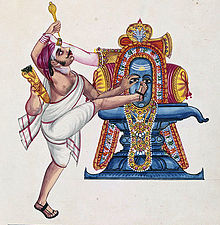Kannappa

Kannappa is a legendary figure in Telugu and South Indian folklore, widely celebrated for his devotion to the Hindu god Shiva.[1] His story is closely connected with the Srikalahasteeswara Temple in Andhra Pradesh. Kannappa, originally a hunter, became renowned for offering his eyes to a Siva Lingam as an act of ultimate devotion. Before he could sacrifice both eyes, Shiva appeared and stopped him.[2][3][4]
Life and legend
[edit]Kannappa was born as Thinna[1][5] into a hunter family from the Chenchu[6] or Boya tribe in what is now Andhra Pradesh. His birthplace is often associated with Uduppura near Sri Kalahasti.[7][8] Though raised in a hunting community, his story is noted for his intense devotion to Shiva, particularly in relation to the Srikalahasti Temple.[9][10]
Kannappa's devotion to Shiva began when he discovered the Vayu Linga of the Srikalahasteeswara Temple while hunting in the forest. Unaware of traditional rituals, he offered Shiva whatever he could, including water from his mouth and meat from his hunts. These acts, while unconventional, were accepted by Shiva due to the hunter's sincerity and pure heart.[11][12]
According to legend, Kannappa once noticed that the Siva Lingam was bleeding from one of its eyes. Without hesitation, he plucked out one of his own eyes and placed it on the lingam to stop the bleeding. When the other eye of the lingam began to bleed, Kannappa prepared to offer his remaining eye. To ensure he could correctly place his eye, he marked the spot with his foot. Moved by this ultimate act of devotion, Shiva appeared and stopped him, restoring his sight and granting him liberation.[13]
Commemoration
[edit]Apart from his native state Andhra Pradesh, Kannappa's devotion is also revered in Tamil Shaivite traditions, and his story is documented in the Periya Puranam, a 12th-century Tamil hagiography of the 63 Nayanars.[14] He is venerated as a symbol of devotion in Shaivism, and his life continues to inspire worshippers.
In popular culture
[edit]Kannappa's life has been depicted in several Indian films across different languages. Notable portrayals include:
- In 1954, Dr. Rajkumar played Kannappa in the Kannada film Bedara Kannappa and the Telugu film Kalahasti Mahatyam.
- The 1976 Telugu film Bhakta Kannappa starred Krishnam Raju in the title role.
Film adaptations
[edit]| Year | Film | Language | Lead role | Notes |
|---|---|---|---|---|
| 1938 | Kannappa Nayanar | Tamil | VN Sundaram | [15] |
| 1954 | Bedara Kannappa | Kannada | Dr. Rajkumar | |
| 1954 | Kalahasti Mahatyam | Telugu | Dr. Rajkumar | |
| 1955 | Shiv Bhakta | Hindi | Shahu Modak | |
| 1976 | Bhakta Kannappa | Telugu | Krishnam Raju | |
| 1988 | Shiva Mecchida Kannappa | Kannada | Shiva Rajkumar, Puneeth Rajkumar (younger version) | |
| 2024 | Kannappa | Telugu | Vishnu Manchu | [16] |
See also
[edit]References
[edit]- ^ a b M. Rama Rao (1970). Mohd. Abdul Waheed Khan (ed.). Select Andhra Temples. p. 16.
Tinna or Kaņņappa, a great devotee of this god, occupies a prominent place in the galaxy of Saiva devotees and his name is familiarly known all over south India.
- ^ Michell, George (2013). Southern India: A Guide to Monuments Sites & Museums. Roli Books Private Limited. ISBN 978-81-7436-903-1.
- ^ E, Desingu Setty (1990). The Veduvar of South India: Society and Religion. Inter-India Publications. ISBN 81-2100-237-0.
- ^ Dehejia, Vidya. Slaves of the Lord: The Path of the Tamil Saints. Munshiram Manoharlal Publishers, 1988. ISBN: 9788121503071.
- ^ Dehejia, Vidya. Slaves of the Lord: The Path of the Tamil Saints. Munshiram Manoharlal Publishers, 1988. ISBN: 9788121503071.
- ^ M. Rama Rao (1970). Mohd. Abdul Waheed Khan (ed.). Select Andhra Temples. p. 29.
There was, in Pottapinādu; a village named Vadumūru, inhabited by a number of Chenchus. Its chief was Natha-nàtha. He begot by his wife, Tande, a son, named Tinna. Tinna grew into a fine youth, skilled in archery and interested in hunting.
- ^ Sekkizhar, Periya Puranam, Tamil Text Society, ISBN: 978-8192880789.
- ^ Nilakanta Sastri, The Colas, University of Madras, 1935.
- ^ Nilakanta Sastri, The Colas, University of Madras, 1935.
- ^ Nilakanta Sastri, The Colas, University of Madras, 1935.
- ^ Peterson, Indira V. Design and Rhetoric in a Sanskrit Court Epic: The Kiratarjuniya of Bharavi. State University of New York Press, 2003. ISBN: 978-0791457386.
- ^ Zvelebil, Kamil. Companion Studies to the History of Tamil Literature. BRILL, 1992. ISBN: 978-9004093652.
- ^ Sekkizhar, Periya Puranam, Tamil Text Society, ISBN: 978-8192880789.
- ^ Vidya Dehejia, Slaves of the Lord: The Path of the Tamil Saints, Munshiram Manoharlal Publishers, 1988, ISBN: 9788121503071.
- ^ FilmiClub. "Kannappa Nayanar (1938)". FilmiClub. Retrieved 21 March 2024.
- ^ Ramachandran, Naman (23 November 2023). "'Lord of the Rings' Vision Revealed by Vishnu Manchu for 'Kannappa,' Featuring Prabhas, Mohanlal and Shiva Rajkumar (EXCLUSIVE)". Variety. Retrieved 23 November 2023.
